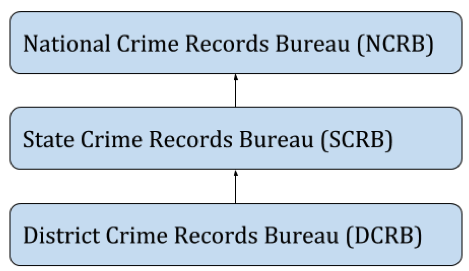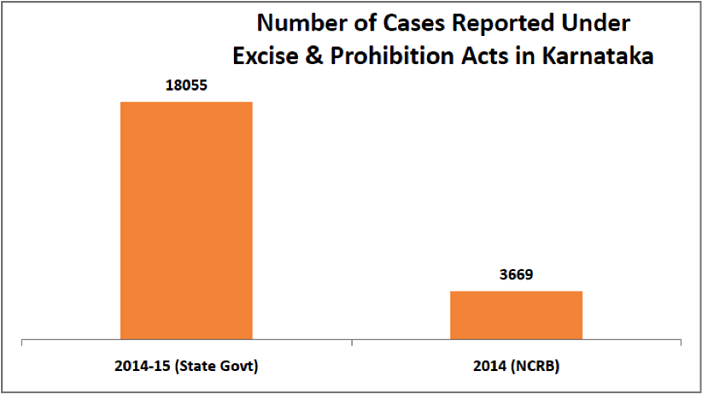[orc]The National Crime Records Bureau (NCRB) is the premier agency of the country that reports crime related data. The NCRB collects data from the respective State Governments. Serious discrepancies have been observed in the data reported by NCRB & the respective State Governments.
Factly had earlier reported that the National Crime Records Bureau (NCRB) data on communal incidents was significantly different from the data put out by the Ministry of Home Affairs (MHA). It now seeems that the discrepancy in data is not limited to communal incidents alone. There are significant discrepancies in the data reported by NCRB and the state governments in the number of cases reported and the amount of liquor seized under the relevant excise laws.
How does NCRB collect the data?
Crime in India is the oldest publication brought out by NCRB. The data for the report is collected by State Crime Records Bureaux (SCRBx) from the District Crime Records Bureaux (DCRBx) and sent to NCRB at the end of the year under reference.
Data on Cases Reported & Amount of Liquor Seized
According to the Crime in India report of NCRB for the year 2014, a total of 186012 cases were reported under the Excise Act and a total amount of 28305198 liters of liquor was seized in the country. Out of the liquor seized, 9117387 liters was country made liquor. Madhya Pradesh reported the highest cases (51,646 cases) accounting for 27.8% of the total cases reported under this Act. There is another head in the NCRB report that lists crimes reported under the prohibition act. Under this head, a total of 420113 cases were reported. The highest number of cases under this Act was reported from Gujarat (237608), more than 50% of all the crimes reported. There is official prohibition in place in Gujarat. Gujarat is followed by Tamil Nadu (107171), Maharashtra (62772) and Kerala (51989) in the number of cases reported under the prohibition act. These four States together accounted for 98.4% of the total such cases registered in the country.
Significant Discrepancies
Factly looked at data from two states to understand the level of under reporting. The data on the website of Karnataka Excise department indicates that a total of 21392 cases were booked under the relevant excise laws in 2013-14, 18055 cases in 2014-15 and 93679 cases in 2015-16 (till September 2015). The NCRB data on the other hand reported 3669 cases (under Excise & Prohibition acts) for Karnataka. The NCRB data puts the total amount of liquor seized at 7766652 liters. The NCRB started collection of seizure data only from 2014. Hence the data is available only for this year.
Similar discrepancies are observed in the data for the state of Telangana. In just one district of Mahbubnagar, the state government reported 17488 cases in 2014-15. An amount of 367819 liters of liquor was seized. But as per NCRB, Telangana as a whole reported just 12690 cases (under both Excise & Prohibition acts) in 2014. The total amount of liquor seized was put at 97368 liters in 2014. The amount of liquor seized in Rangareddy district from April 2014 to December 2014 is 129902 liters as per the data of the state government. The numbers from one single district are way more than the numbers reported by NCRB for the entire state.
Are States under reporting crime data?
These statistics reveal multiple problems and make it difficult to believe NCRB data on face value. It also raises serious doubts about the veracity of the data being shared by the state governments. It might very well be the case that the state governments are under reporting crime data.
The difference in the way the data is collated also makes it difficult to compare. Most states report data on a financial year basis while the NCRB data is reported on a calendar year basis. It is for the NCRB & the States to explain these discrepancies.




